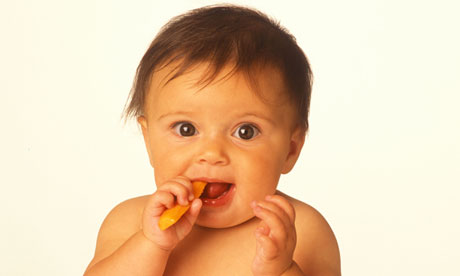
It sounds painful and it can be. But weaning is simply the introduction of solid food into a baby's diet. It does not mean you should stop breastfeeding – although you may need to give less milk as your baby eats more. There is, however, a constant, emotional debate about when, what and how to do it.
A decade ago the World Health Organisation said babies should be exclusively fed breast milk for the first six months. This means nothing else, no formula milk, no water. But a paper in the Archives of Disease in Childhood by Dr Martin Platt, a paediatrician at the Royal Victoria Infirmary in 2009 said there is no magic age to wean a baby.
An analysis of research in the BMJ this week found that there is no good evidence to suggest babies would be harmed by starting solids earlier than six months. This is different, however, in developing countries, where contaminated water means that breastfeeding (which also protects against infection) only for the first six months is the best option.
When should you start to wean?
Although NHS advice is the same as the WHO's, fewer than 1% of mothers in the UK exclusively breastfeed for six months. They may have ignored the breast is best message, but parents have taken on board the message to delay solids. Surveys show that while in the 1970s nearly all infants had solids by four months, only half had done by 2005. The average age of starting solids was 19 weeks in 2005 and this is probably rising.
Babies do give clues about when they are ready to try solids – they show an interest in people eating, they can sit up and reach and chew on anything they can grab. They may want to feed more. There is some disagreement about whether waking in the night suggests hunger or not.
It is likely to be OK to start introducing some solid food cautiously between four and six months, according to a review by the European Commission. Doing so earlier may increase the risk of allergy and obesity in later life. The age you start should depend on your baby, its size and how active he or she is. It's not easy to introduce a baby to solids if he or she can't sit up and engage with the process. Babies are all individuals.
What are the risks of not weaning until six months?
If you wait too long to wean and only breastfeed there is some evidence to show you may have an increased risk of your baby having an iron deficiency. Starting too early or too late can increase the risk of your baby developing allergies.
What should you start with?
Try a few spoonfuls of mashed or pureed fruit, baby cereal (or baby rice) or vegetables. Add in some breast or formula milk to make it runny. Use a baby spoon. Try once a day and move on to two and three times within a few weeks.
How do you start?
Be relaxed. All babies learn to eat so do not get worked up or take your baby's rejection of your food personally, or worry that he or she will starve. It is easier to use a high chair to start solids. If your baby is not interested in solids then do not persist. Do not try to force feed your baby. (This is more tempting than you might think.) Let your baby stick their fingers into the food, throw it around and smear it all over you. Sorry, but this is part of weaning. Try to include your baby in family meals, however gruesome it is at first. Move on to giving your baby the same food as everyone else (pureed initially) but avoid salt. I'm not mad on carrot sticks or apple pieces or anything hard that a baby can choke on and also I cut up chicken and other meat into very, very small pieces. Avoid little, round foods that a baby might choke on.
Later on
Some parents start what's known as baby-led weaning early on – handing their baby a banana and letting him or her get on with it. After your baby is eating pureed, mashed-up food and increasingly as he or she has teeth you should introduce more lumps into food as well as finger foods such as cooked carrot sticks (overcooked until soft, and cooled), lightly toasted bread and slices of cheese. Fromage frais is popular with many babies and I admit to giving the occasional ice-cream.
You can download an NHS leaflet on weaning at dh.gov.uk.

